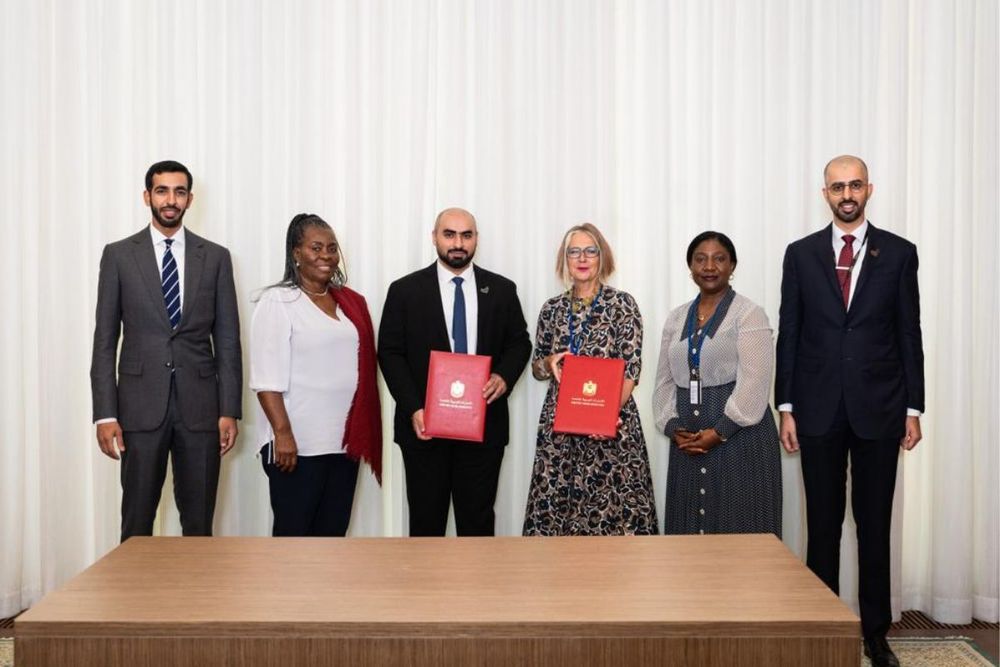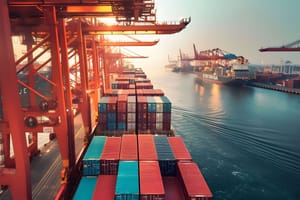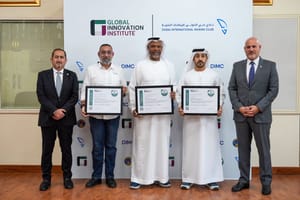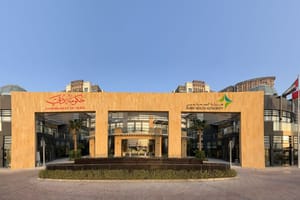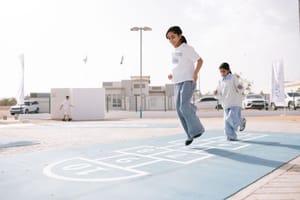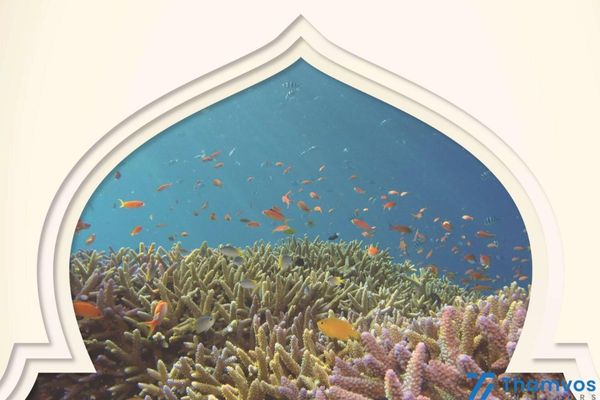Sheikh Shakhboot bin Nahyan Al Nahyan, Minister of State, and Omar Sultan Al Olama, Minister of State for Artificial Intelligence, Digital Economy and Remote Work Applications and Chairman of the Digital School's Board of Directors, witnessed the signing of a Memorandum of Understanding (MoU) at the UAE Permanent Mission during the United Nations General Assembly.
The MoU, which was signed by Dr. Waleed Al Ali, Secretary-General of the Digital School, which comes under the Mohammed Bin Rashid Al Maktoum Global Initiatives umbrella, and Ute Klamert, World Food Programme's Assistant Executive Director for Partnerships & Advocacy, to expand the scope of The Digital School's current activities, to enhance partnerships and to reach rural communities and students across sub-Saharan Africa.
The signing was also witnessed by Ester-Anna Nghipondoka, Minister of Education, Arts and Culture of Namibia, and Estherine Lisinge-Fotabong, Director of Programme Implementation and Coordination at the NEPAD Planning and Coordinating Agency.
Sheikh Shakhboot said,
"Launched by Mohammed Bin Rashid Al Maktoum Global Initiatives, the Digital School stands as a vital initiative which comes as a result of the UAE leadership's vision to support education based on its firm belief that investment in this field is necessary for the development of societies. This is evidenced by its well-established track record of enhancing education on a global scale.
"The UAE has always focused on this vital sector and considers it amongst its developmental priorities, and in partnership with the esteemed organisations the World Food Programme and the Southern African Development Community (SADC), we are eager to see the expansion of the Digital School across sub-Saharan Africa and the continent."
He added,
"The expansion of the Digital School represents our collective efforts towards the continent's growth and development. The UAE and African nations' historical relations serve as a testament to the enduring partnership that Binds us, and this continues to guide us towards an even brighter future."
For his part, Al Olama said,
"The future of education relies significantly on the utilisation of digital solutions, which are a pivotal factor in empowering students worldwide to access quality education," adding that The Digital School is a pioneering example of developing digital education and transitioning to the application phase, making it accessible to students in various regions of the world, particularly for less privileged communities, providing them with the opportunity to learn.
He added,
"The launch of the new partnership reflects the Digital School's humanitarian message and translates its endeavour to expand the circle of interest and reach more students across the African continent. The aim is to provide students with opportunities to learn and empower their role in shaping their community's future. Together with UAE Africa Connect, we aspire to illuminate the path to a brighter future for students in remote areas of sub-Saharan Africa ."
The World Food Programme's Regional Director for Southern Africa, Dr. Menghestab Haile, said,
"WFP Southern Africa considers this collaboration as an opportunity to assist and support national governments to strengthen the school food program by adding the component of digital education at the primary level in underprivileged communities in Africa and thereby 'feeding the body and the mind'. The inclusion of the private sector, Governments and SADC will ensure the sustainability of this programme.
"This MoU between WFP and The Digital School is to support member countries to improve education and nutrition outcomes in the vulnerable communities by comBining school meals with digital education in a region with very high youth unemployment."
The MoU aims to deliver educational opportunities to vulnerable students in several African countries, and by expanding the Digital School's activity, it seeks to reach remote areas. It aims to provide high-quality digital and hybrid education that is empowered by digital technologies and aligned with national standards, offering strategic advice to help form a national strategy for digital education and facilitating access to a global network of partners, teachers, and digital educators, while supporting educational content development.
Further, it provides professional development programmes for digital educators in collaboration with Arizona State University.
To date, the Digital School has successfully trained 1,500 educators and onboarded 60,000 students in a total of eight countries, including two within Africa. This highlights the UAE's unwavering commitment to education and highlights its prominent role as a global hub for knowledge transfer.
Furthermore, the Southern African Development Community, the World Food Programme and The Digital School announced a collaboration to convene the SADC Digital Education High Level Meeting from 27 - 29 November 2023 in Cape Town in order to develop a digital education roadmap for southern Africa. A number of digital education projects were also announced, with the aim to expand the network of partners, including those from the private sector and telecom companies, heralding a new era of collaboration and innovation in digital education.
As part of the expansion of the Digital School, UAE Africa Connect will now become an endorser of the Digital School and will provide support to the Mohammed Bin Rashid Al Maktoum Global Initiative to further enhance the school's efforts across the African continent. These partnerships reflect the platform's commitment to bridging educational gaps in sub-Saharan African countries to achieve a future in which digital tools support the pursuit of knowledge and academic excellence.
News Source: Emirates News Agency
